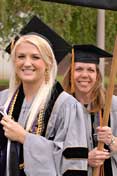Briefing the Public on Native Law
Law professor pens book explaining American Indian law to broad audiences
By Tara Roberts
Photos by UI Photo Services
With five major American Indian governments located across the state, Idaho’s citizens are bound at some point to drive through tribal territory, make a purchase at a tribal business or otherwise interact with tribal land. But most Idahoans know little about American Indian law or legal history.
Angelique Townsend EagleWoman, a professor and James E. Rogers Fellow in American Indian law at the University of Idaho College of Law, wants that to change.
With Stacy L. Leeds, dean of the University of Arkansas’ School of Law, EagleWoman recently authored “Mastering American Indian Law,” a book intended to give anyone from undergraduate students to state judges a working knowledge of tribal law.
“From my perspective, the tribal view and depth of legal history is not commonly known and would enhance and enrich any educational program, and should be a matter of common knowledge in the legal field,” says EagleWoman, who is a citizen of the Sisseton-Wahpeton Dakota Oyate of the Lake Traverse Reservation.
“Our intent as co-authors was to create a text that simply and easily explains U.S. Indian policy eras, tribal government and justice systems, and relationships on the federal, state and tribal levels.”
The book features chapters on Indian property law, criminal jurisdiction in Indian country, tribal family law, natural resources, tribal-state relations and more. As part of Carolina Academic Press’ Mastering Series, the book is designed to help readers strategically approach and understand a complex topic.
In addition to publishing her book, EagleWoman actively reaches out to groups who benefit from an improved understanding of American Indian law. She speaks to federal and state agencies about working effectively with tribal governments, and the Idaho Supreme Court recently appointed her to the Tribal-State Court Forum.
EagleWoman directs the College of Law’s Native American Law Program, which allows Indian and non-Indian students to complete a course of study on Native American law topics during the regular course of earning their Juris Doctor.
Whether lawyer or layperson, people in the United States should be informed about native law issues, EagleWoman says, because they have a role in them.
“Most U.S. citizens don’t know that the U.S. Supreme Court has held that the Congress has plenary, or absolute, authority over American Indians,” she says. “Since the Congress is elected by U.S. citizens, this means the public has a role in this area of law.”






